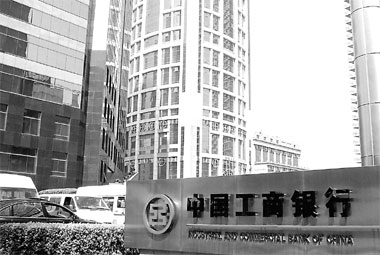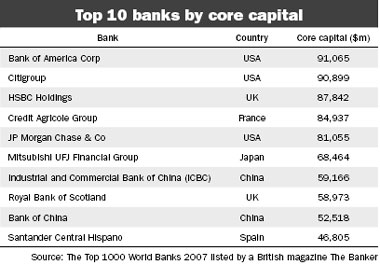


When the Industrial and Commercial Bank of China (ICBC) opened a Hong Kong branch in 1995, even the most optimistic were not likely to think the bank would one day be one of the top in the metropolis.
But today ICBC (Asia), a Hong Kong subsidiary of ICBC, has grown into the No 6 bank by assets in one of the world's leading financial centers.
Its growth came largely through a series of acquisitions and restructuring measures in the past few years:
In July 2000, ICBC paid HK$1.8 billion to acquire Union Bank of Hong Kong Ltd, established in 1964 and publicly listed in 1973, and changed the bank's name to ICBC (Asia).
In July 2001, ICBC injected the corporate banking business of its Hong Kong branch into ICBC (Asia).
In April 2004, ICBC (Asia) bought Fortis Bank Hong Kong's retail and commercial banking operations, further expanding its business in the city.
And in 2005, it acquired Shenzhen-based Chinese Mercantile Bank, extending services to the mainland.

"We are delighted to see that acquisition moves in Hong Kong were correct," says Pan Gongsheng, secretary to ICBC's board of directors.
"If we hadn't done that, we may have still been small in the market," he says.
The bank is now planning to accelerate its overseas expansion through acquisitions, as well as organic growth, after raising $21.9 billion in a huge initial public offering (IPO) last October.
A few months after that, on December 30, ICBC signed an agreement to buy a 90 percent stake in Indonesian lender Bank Halim .
'No money, no time'
"Several years ago, we could not think of acquisitions in overseas markets. We had no money, no time and no energy to do that," Pan says.
At that time, major Chinese banks, including ICBC, were troubled by their own problems as they attempted to deal with huge bad loans mainly resulting from policy-mandated lending.
Successful transformation of ICBC, especially the bank's financial restructuring and public listings on the Hong Kong and Shanghai stock markets, enabled it to make acquisitions overseas through improved capital strength and corporate governance.
"Since our IPO, the bank's board had been mulling an overseas expansion plan as an important part of an overall development strategy," Pan says.
Its 2006 annual report showed the bank's overseas assets were $26.7 billion by the end of last year, accounting for less than 3 percent of the bank's total assets.
"We are looking for more mergers and acquisitions (M&As) in overseas markets, as M&As are a better, quicker way to expand rather than setting up new branches," Pan says.
ICBC now has 98 organizations, including branches, subsidiary entities and representative offices, in 13 countries and regions.
Much of Pan's work after the bank's IPO was talking with counterparts in overseas markets to find potential partners.
He went to Vietnam early this month to give a lecture to lenders in that country - the banking industry there is undergoing similar restructuring to that in China several years ago.
"We will make a further move," Pan says, adding that taking a controlling share of Bank Halim was just a beginning.
Bank Halim had $50 million of assets at the end of 2005, with a capital adequacy ratio of 57.88 percent and a non-performing loan ratio of 1.32 percent. It has only 12 outlets in the country.
"The significance of this is it provides valuable experience for our international expansion," Pan says.
The strategy in starting with a small takeover is that any company cannot afford the failure of a big foreign acquisition.
"Generally speaking, an enterprise needs eight to 10 years to recover if an acquisition fails," Pan says.
He is confident about the acquisition of Bank Halim, which is almost complete.
"We are going to send a management team there very soon," Pan says.
While considering more M&As, the bank is also accelerating its pace of opening new branches overseas.
In the first half of the year, ICBC applied to open new branches in the US, Russia, Australia and Middle East.
(China Daily 08/20/2007 page5)













